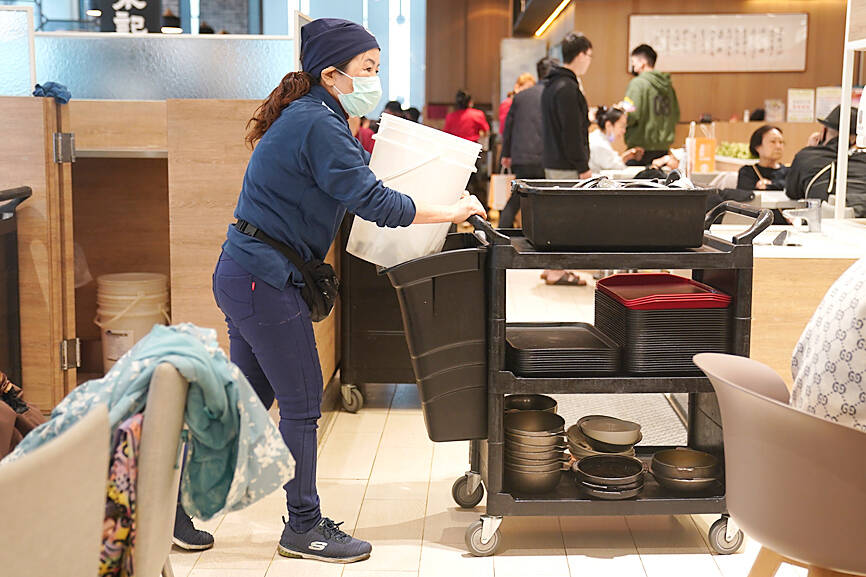Taiwan’s services sector is finding it hard to hire enough staff to contend with a post-COVID-19 pandemic pickup in tourism and spending, further pressuring the economy as Taiwan is struggling to return to growth.
Restaurateur Mai Bach finds the labor shortage problem impossible to avoid.
“Almost every restaurant” is dealing with a lack of workers, she said, adding that long-standing restrictions on foreign labor in the sector have made it tough to find a fix.

Photo: CNA
“Everyone’s just working double shifts,” said Bach, who cofounded the vegan restaurant group Ooh Cha Cha Ltd (自然食).
She said the problem has affected her friends in the industry, including one woman who was forced to reduce her restaurant’s operating hours because of a lack of staff.
Concerns about meeting demand are likely to exacerbate in the coming months as the nation tries to dig itself out of a deep economic slump.
The surging demand for workers is rooted in several factors. Like in many developed economies, the nation’s population is rapidly aging, with the elderly expected to account for more than 20 percent of the populace by 2025. Historically low wages in hospitality have complicated things, discouraging potential workers.
The pandemic created more problems as workers retired or left their jobs.
The labor force dropped sharply after reaching a record high in August 2019. While the number of people in the labor market has steadily risen in recent months, it still has not returned to pre-pandemic levels.
The staffing crunch described by Bach and others also comes as the unemployment rate hit a record low of 3.58 percent in February — suggesting the problem is more related to the lack of workers.
The shortfall has stretched across the hospitality industry.
Some hotels are afraid to take bookings due to a labor shortage, local media reported, citing comments made last month at a trade meeting by Regent Hotels & Resorts (晶華麗晶酒店集團) chairman Steven Pan (潘思亮).
“The shortage is everywhere and it’s creating huge pressure right now,” said Elliott Fan (樊家忠), a professor at National Taiwan University’s Department of Economics.
Labor market shocks from short-term factors — such as the pandemic — can take up to two years to resolve, he said.
That is troubling news for an economy already under strain from a big drop-off in global demand for computer chips, which is usually a key contributor to Taiwan's economic growth.
Tourism only accounted for 4 percent of the nation's GDP prior to the pandemic, but the economy now needs all the help it can get, Oxford Economics Ltd economist Lloyd Chan (陳進來) said.
“Taiwan is looking at a semiconductor downturn, so the tourism and services sector could now have an impact on GDP,” Chan said.

Hon Hai Precision Industry Co (鴻海精密) yesterday said that its research institute has launched its first advanced artificial intelligence (AI) large language model (LLM) using traditional Chinese, with technology assistance from Nvidia Corp. Hon Hai, also known as Foxconn Technology Group (富士康科技集團), said the LLM, FoxBrain, is expected to improve its data analysis capabilities for smart manufacturing, and electric vehicle and smart city development. An LLM is a type of AI trained on vast amounts of text data and uses deep learning techniques, particularly neural networks, to process and generate language. They are essential for building and improving AI-powered servers. Nvidia provided assistance

DOMESTIC SUPPLY: The probe comes as Donald Trump has called for the repeal of the US$52.7 billion CHIPS and Science Act, which the US Congress passed in 2022 The Office of the US Trade Representative is to hold a hearing tomorrow into older Chinese-made “legacy” semiconductors that could heap more US tariffs on chips from China that power everyday goods from cars to washing machines to telecoms equipment. The probe, which began during former US president Joe Biden’s tenure in December last year, aims to protect US and other semiconductor producers from China’s massive state-driven buildup of domestic chip supply. A 50 percent US tariff on Chinese semiconductors began on Jan. 1. Legacy chips use older manufacturing processes introduced more than a decade ago and are often far simpler than

STILL HOPEFUL: Delayed payment of NT$5.35 billion from an Indian server client sent its earnings plunging last year, but the firm expects a gradual pickup ahead Asustek Computer Inc (華碩), the world’s No. 5 PC vendor, yesterday reported an 87 percent slump in net profit for last year, dragged by a massive overdue payment from an Indian cloud service provider. The Indian customer has delayed payment totaling NT$5.35 billion (US$162.7 million), Asustek chief financial officer Nick Wu (吳長榮) told an online earnings conference. Asustek shipped servers to India between April and June last year. The customer told Asustek that it is launching multiple fundraising projects and expected to repay the debt in the short term, Wu said. The Indian customer accounted for less than 10 percent to Asustek’s

Gasoline and diesel prices this week are to decrease NT$0.5 and NT$1 per liter respectively as international crude prices continued to fall last week, CPC Corp, Taiwan (CPC, 台灣中油) and Formosa Petrochemical Corp (台塑石化) said yesterday. Effective today, gasoline prices at CPC and Formosa stations are to decrease to NT$29.2, NT$30.7 and NT$32.7 per liter for 92, 95 and 98-octane unleaded gasoline respectively, while premium diesel is to cost NT$27.9 per liter at CPC stations and NT$27.7 at Formosa pumps, the companies said in separate statements. Global crude oil prices dropped last week after the eight OPEC+ members said they would